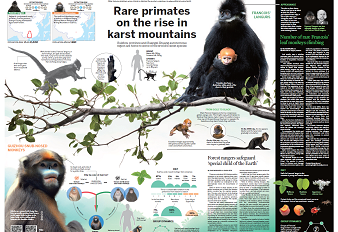Zhuofu grassland revived and thriving
Editor's note: As protection of the planet's flora, fauna and resources becomes increasingly important, China Daily is publishing a series of stories to illustrate the country's commitment to safeguarding the natural world.
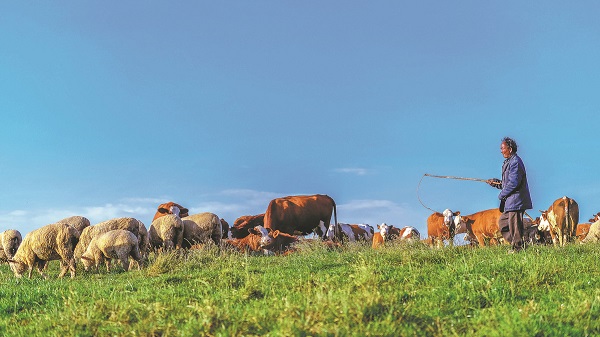
A herdsman drives his cattle and sheep onto the grassland in Weining Yi-Hui-Miao autonomous county in Bijie, Guizhou province. LI JINGCHENG/FOR CHINA DAILY
Balanced approach ensures healthy ecology, while boosting rural economy
More than 30 years of ecological restoration work has transformed Zhuofu's barren hills into grassland and boosted economic development in Weining Yi-Hui-Miao autonomous county, Bijie city, Guizhou province.
In the 1980s, after conducting a thorough investigation, Ren Jizhou, a grassland ecologist and academician with the Chinese Academy of Engineering, proposed improving both the ecology and productivity of the grassland.
In 1986, Zhuofu grassland was established as a testing, demonstration and promotion base for a grassland animal husbandry system project. The theory and practice developed from the experiment have since been widely applied in pastoral areas and resulted in huge economic benefits.
Ren, now in his late 90s, founded the "animal product unit" index for assessing grassland productivity, putting an end to the difficulty of comparing different animal by-products.
After aerial seeding of Zhuofu was undertaken, the sparse hills gradually became covered with grass shoots and the area eventually gained the appearance of a prairie.
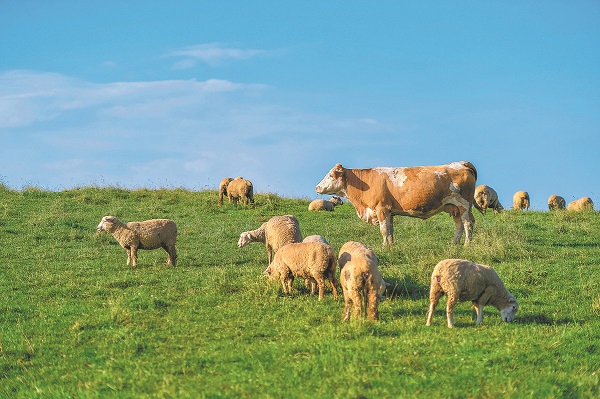
Cattle and sheep wander and graze on the grassland. LI JINGCHENG/FOR CHINA DAILY
Covering an area of nearly 600 hectares, the grassland now boasts around 2,000 cattle and 5,000 sheep. Animal husbandry has become a pillar industry in Weining county, Bijie, and brings prosperity to local residents. Many of them have bought cars, People's Daily reported.
Wen Zhongcheng, a 73-year-old herder, takes care of cattle in pastures for Guan Shaogang, a major cattle producer.
Wen is quite satisfied with his annual salary. "My job is to take care of 110 cattle from May to the end of October. I can earn 25,000 yuan ($3,416) every year," he said.
"When I was a child there was only weed, and overgrazing leads to grassland degradation," Wen added.
To avoid such an ecological disaster from happening again, local residents are herding according to the grassland's carrying capacity.
Guan said, "My family ranch adopts scientific farming methods by restricting herding periods in a section every three to five days, and controls the number of cattle and sheep."
The improved environment makes the cultivation of cash crops possible. In Xiejia village, Lyu Yongkun is in charge of an apple orchard.
"The orchard covers about 67 hectares and its overall output value can reach 4.5 million yuan. Thanks to better transportation facilities, it takes only one hour from Weiyuan's urban area to here. Now we can attract hundreds of tourists to pick apples every day," said Lyu.
Huang Yi, a tourist from Xiaohai township, said: "We took a group trip and picked 400 to 500 kilograms of apple. Now the trunk is full of apples."
The high-quality apples produced at the plantation are also sold in Shanghai and Beijing. Under Lyu's technical guidance, dozens of households can earn over 100,000 yuan a year in Xiejia village.
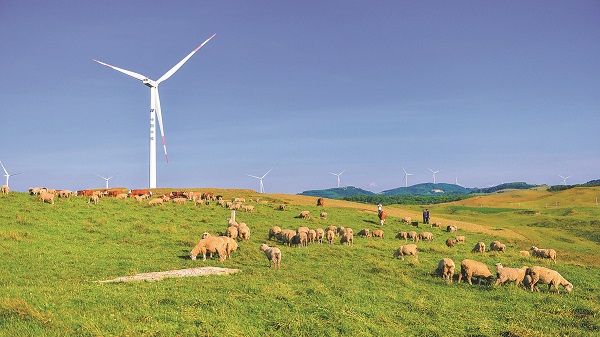
Wind turbines generate clean energy on the grassland. LI JINGCHENG/FOR CHINA DAILY
With the help of local government, each village in the Xueshan township, Weining, has its own specialty industry, including tobacco growing, chicken farming and beekeeping.
An Qingyi, director of the forestry station in Xueshan, said since 2013, the township has implemented a project to return farmland to forest and grassland. To achieve this it has planted more than 3,670 hectares of Huashan pine, 3,870 hectares of apples, 467 hectares of Sichuan pepper and over 330 hectares of walnuts.
"The key to afforestation lies in management. Otherwise, it won't be effective," An said.
To ensure the long-term and stable development of forests and grasslands, the station has formed a 267-person patrol team that conducts regular patrols to protect the mountains and grasslands throughout the year, regardless of wind or rain.
Meanwhile, the grassland has also become an ideal place for generating clean energy. It boasts the largest wind-solar hybrid power station in Guizhou that generates 450 million kilowatt-hours of energy every year. Compared with thermal power, it can save 135,000 metric tons of standard coal and reduce 350,000 tons of carbon dioxide emission, Weiyuan Daily News reported.
京ICP备13028878号-8







 Overview
Overview Guiyang
Guiyang Guian New Area
Guian New Area Liupanshui
Liupanshui Anshun
Anshun Qianxinan
Qianxinan Qiandongnan
Qiandongnan Qiannan
Qiannan Zunyi
Zunyi Tongren
Tongren Bijie
Bijie Guizhou fosters cross-cultural bonds in Europe
Guizhou fosters cross-cultural bonds in Europe 18th Guizhou Tourism Industry Development Conference
18th Guizhou Tourism Industry Development Conference 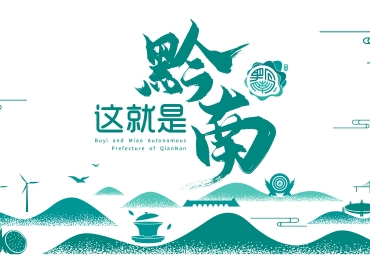 Discover natural beauty in Qiannan, Guizhou
Discover natural beauty in Qiannan, Guizhou 
